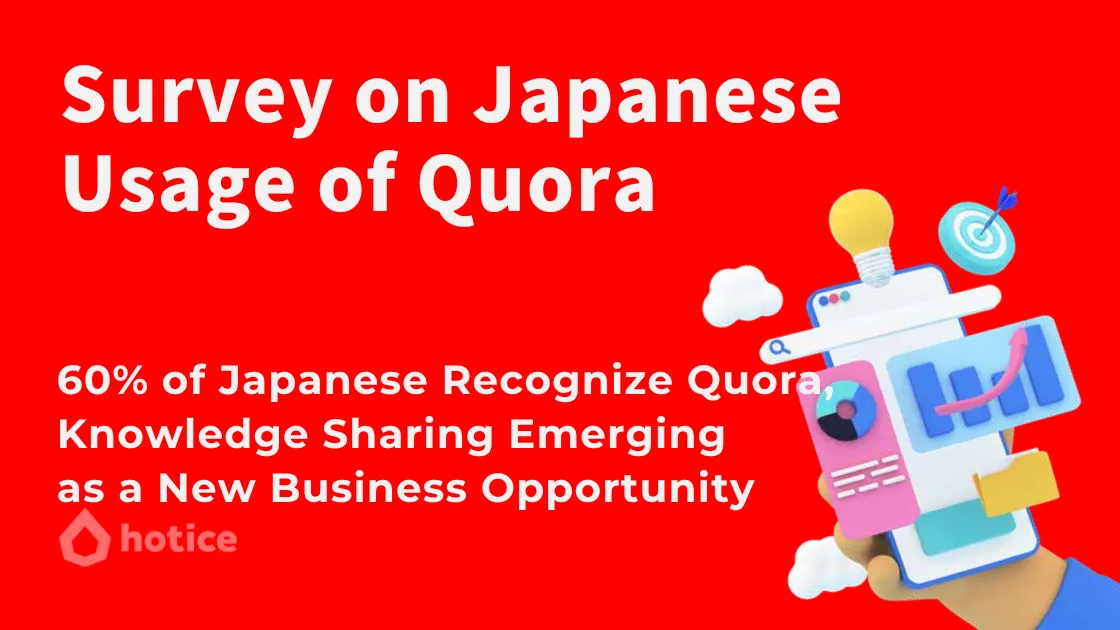[Survey of 349 People] 60% of Japanese Recognize Quora, Knowledge Sharing Emerging as a New Business Opportunity

INDEX
- 1. Survey Overview
- 2. Quora Recognition Rate Reaches 60%: Growing Presence in Japan
- 3. Japanese Users Mainly Use Quora for “Information Gathering” and “Hobbies”
- 4. Quora Information Drives Purchasing and Learning Behaviors Among Japanese Users
- 5. 80% of Japanese Business Professionals Use Quora
- 6. 90% of Japanese Users Report Positive Results
- 7. The Growing Presence of Quora in the Japanese Market
Quora is a platform where experts and entrepreneurs share their knowledge, allowing people around the world to learn from one another through questions and answers. While it has already become established overseas as a “social network for knowledge,” its actual presence in Japan has not been fully understood.
To address this, hotice conducted an original survey of 349 general users in Japan, examining awareness of Quora, purposes of use, and its impact on behavior and business. The results revealed that 60% recognized Quora, and among those with usage experience, 80% had applied it to business. Furthermore, nearly 90% of these respondents reported experiencing tangible benefits.
Quora is evolving from a simple information-gathering site into a “social network for building trust through knowledge sharing.” As a tool for enhancing brand value by showcasing expertise, it is opening up new possibilities in the Japanese market.
Survey Overview
This survey was conducted to clarify the awareness, usage, and current state of business utilization of Quora in Japan. While Quora has already been widely adopted by experts and companies worldwide as a “platform for sharing knowledge through questions and answers,” no clear data had previously existed on its expansion within the Japanese market.
To quantitatively capture Japanese users’ awareness, behavior, and the impact on business activities, we carried out an original survey.
The survey was conducted online in the form of a questionnaire, with responses collected from 349 general users residing in Japan. By targeting a wide range of participants regardless of age, occupation, or region, we were able to perform a multifaceted analysis that incorporated both individual and corporate perspectives.
The survey was conducted on October 7, 2025. The questions covered seven key areas: “awareness,” “usage frequency,” “usage purpose,” “behavioral impact,” “business utilization,” “effectiveness,” and “future intentions.” The scope included not only experienced users but also the perceptions of non-users. In particular, the survey focused on how Quora, as a platform for knowledge sharing, influences purchasing, learning, and career decisions, as well as corporate communication strategies.
Quora Recognition Rate Reaches 60%: Growing Presence in Japan

This survey revealed that Quora’s recognition rate in Japan stands at 60.5%. Out of 349 respondents, 211 answered that they “know” the platform, showing that a majority are aware of this knowledge-sharing service. On the other hand, 39.5% responded “don’t know,” indicating that recognition is still in the process of expanding domestically.

When asked about actual usage, only a minority of Japanese users reported using Quora on a daily basis. 8.1% said they use it “almost every day,” 29.9% “several times a week,” 30.3% “a few times a month,” and 31.8% “rarely use it.” In other words, while awareness is growing, only about 40% of users can be considered active.
This trend is closely related to the nature of Quora itself. Unlike social networks designed for entertainment or casual communication, Quora is a service specialized in “knowledge sharing” and “problem solving.” As a result, users tend to access the platform not during short breaks for light browsing, but when they want to deeply explore a specific topic.
Nevertheless, the fact that over 60% of people in Japan recognize Quora is noteworthy. The platform is highly regarded as a place where reliable information from experts and business professionals gathers, and the number of users engaging with it to “gain knowledge” and “share ideas” is steadily increasing.
Looking ahead, as the culture of sharing expertise and experiences spreads within Japan, Quora has the potential to evolve from being merely “a place to read” into “a place to build trust through sharing.”
Japanese Users Mainly Use Quora for “Information Gathering” and “Hobbies”

Among Japanese users of Quora, the primary purposes are “information gathering (news and trends)” and “participation in hobby communities,” both cited by 51.4% and 50.0% of respondents. Following this, “learning and research” accounted for 43.1%, highlighting that the platform is often used for intellectual exploration, ranging from solving everyday questions to investigating specialized fields.
In contrast, only 22.2% said they use Quora for “interacting with overseas users.” While the platform’s international nature—centered on English-speaking users—is acknowledged, most Japanese participants appear to prioritize domestic information gathering and sharing interests within Japan.
There was also a notable portion of respondents who selected “Other” and provided free responses, including business information gathering, career development, and sharing specialized expertise. This suggests that the purposes of Quora usage in Japan are diversifying.
The results clearly show that Quora is widely recognized in Japan as a “platform for gaining knowledge.” Unlike social networks or video media that focus on the rapid spread of information, Quora is used with the aim of “deep understanding” and “exposure to diverse perspectives.”
In particular, the fact that more than 40% use Quora for learning and research indicates that Japanese users are beginning to adopt the platform as a “place for learning.”
Furthermore, the high usage for hobbies and personal interests suggests that Japanese users are starting to view “knowledge sharing” not as a rigid academic activity, but rather as an extension of everyday themes. As Quora continues to expand its Japanese-language content, the platform is likely to grow into a space where “learning” and “empathy” coexist, broadening the purposes for which Japanese users engage with it.
Quora Information Drives Purchasing and Learning Behaviors Among Japanese Users

Many Japanese users reported taking action as a result of information they encountered on Quora, showing that the platform’s influence goes beyond simple browsing.
The most common response was “researched a product or service” (54.9%), followed by “changed their learning or career direction” (34.7%) and “actually made a purchase” (34.0%). Additionally, 29.9% said they “began sharing information themselves,” and 25.0% reported that they “changed their lifestyle or daily habits.” These results indicate that Quora plays a significant role in shaping decision-making and personal growth among Japanese users.
What is particularly noteworthy is that Quora not only influences purchasing and learning but also inspires active participation through content creation. While many social media platforms are primarily consumption-driven, Quora fosters a flow where users move from “gaining knowledge” to “sharing it themselves.” This unique cyclical structure, less commonly seen on other platforms, is beginning to take root in Japan.
Furthermore, with nearly one-third of respondents stating that they experienced “lifestyle changes” or “career shifts,” Quora appears to impact not only everyday actions but also broader life choices and values.
This is likely because much of the content is based on firsthand experiences shared by experts and practitioners, making Quora a highly trusted “source of lived knowledge” for Japanese users.
These findings suggest that in Japan, Quora is evolving beyond a simple Q&A site into a platform that encourages behavioral change through shared knowledge and experiences. As users increasingly exchange opinions and share practical insights, Quora’s influence in the Japanese market is expected to grow even further.
80% of Japanese Business Professionals Use Quora

The survey revealed that 78.5% of Japanese users reported having used Quora in a business context. This shows that in Japan, Quora is actively utilized not only as a platform for knowledge sharing but also for practical, professional purposes.

The most common form of business use was “sharing expertise and opinions” (47.8%), followed by “introducing company services or products” (40.7%). Other notable uses included “industry and competitor research” (32.7%), “recruitment and hiring” (31.0%), and “SEO measures and acquiring external traffic” (29.2%). These results highlight that Quora is leveraged across a wide range of business functions, including communication, research, recruitment, and customer acquisition.
This trend suggests that many Japanese users view Quora as a “trusted communication channel.” The platform’s low anonymity—where real names and professional expertise are often required—makes it well-suited for companies and specialists to share their knowledge. In particular, in B2B industries and professional fields, there have been cases where activity on Quora directly led to inquiries and business leads.
It is also noteworthy that over 30% of respondents use Quora for “industry and competitor research” and “recruitment purposes.” Japanese companies are increasingly using the platform to gather insights on potential talent and partner organizations, as well as to track industry trends. What was once primarily an overseas phenomenon is now taking root in Japan, where Quora is emerging as a tool for both research and communication.
These findings indicate that Quora is being recognized in Japan not merely as a knowledge-sharing platform, but as a multifunctional business tool that simultaneously supports brand recognition, recruitment, and market understanding.
90% of Japanese Users Report Positive Results

Among the 113 Japanese users who said they had used Quora for business, 93.8% reported experiencing positive results.
Breaking down the responses, 34.5% said they achieved “significant results,” while 59.3% reported “partial results.” This means that more than 90% felt tangible benefits, an exceptionally high level of satisfaction. Meanwhile, 6.2% said they experienced “little effect,” and no respondents answered that there was “no effect at all.”
These findings show that Quora has earned trust among Japanese business professionals as a “platform that delivers results.” Increasing numbers of cases link posts and answers on Quora to greater recognition within specialized fields, new customer connections, and SEO benefits. The platform’s real-name system also enhances credibility, which likely contributes to its business effectiveness.

When asked about future use, 24.8% said they want to “actively use” Quora, while 69.9% said they would use it “as needed.” In total, 94.7% expressed an intention to continue using Quora in some form, indicating that nearly all who tried it are willing to stick with it.
This result highlights that Quora is not just a tool for sharing information, but is recognized as a long-term business foundation that produces results by building trust. Unlike short-term advertising measures, Quora functions as a space where knowledge sharing enhances brand value—one of the key reasons it is gaining strong support among Japanese users.
As Japanese-language content and answers continue to grow, Quora is likely to become further established in Japan as a “knowledge-sharing medium for producing results” for both companies and professionals.
The Growing Presence of Quora in the Japanese Market
This survey revealed that 60% of Japanese respondents are aware of Quora and use it for a variety of purposes such as information gathering, learning, and hobbies. In particular, nearly 80% have used it for business, and more than 90% of those reported seeing positive results.
For Japanese users, Quora is becoming not only a place to access reliable information but also a platform to share their own expertise and build trust. Looking ahead, it is highly likely to become an important channel for branding and global PR centered on knowledge sharing.
At hotice, we support Japanese companies in communication and marketing through research and strategic use of international social media platforms such as Quora.
Please feel free to contact us for advice on leveraging overseas social networks, including Quora, as part of your strategy.






